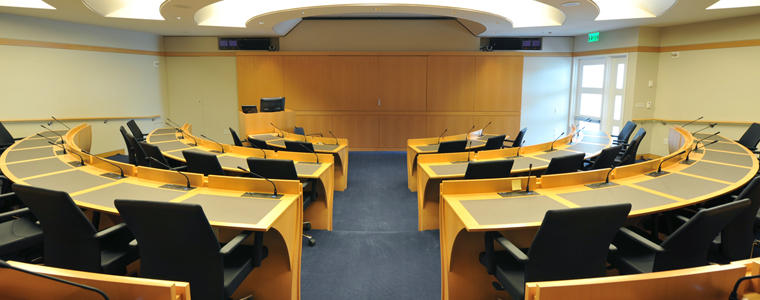The Institute has been supporting the efforts of civil society groups in Sudan and South Sudan to encourage constitution-writing processes that are “inclusive, participatory and transparent.”

USIP hosted a briefing on March 27 to examine “Constitution Making in the Two Sudans,” an event that offered a sobering look at the difficulties involved in the development of new, permanent constitutions in Sudan and in newly independent South Sudan. The Institute has been supporting the efforts of civil society groups in both countries to encourage constitution-writing processes that are “inclusive, participatory and transparent,” as Jason Gluck (pictured far right), senior rule of law adviser at USIP, put it. He said both countries are in a “historical moment” for creating constitutions, adding, “Process may matter more than the text itself.”
Jonathan Temin (far left), the head of USIP’s Sudan programs, said there was “a real opportunity to lay a solid foundation for the years to come” but also real concerns that the opportunities could be missed. In Sudan, a coalition of more than 40 nongovernmental groups is attempting to educate Sudanese about what a constitution-writing process ought to look like, as well as encourage government officials to move in that direction.
However, noted Nureldin Satti (middle left), a former Sudanese diplomat and now secretary general of Sudan’s National Library, the prospect of a new constitution has become “a very divisive issue,” with disagreement over whether it should move in an Islamist direction or a secular one. In South Sudan, a process is underway but is moving slowly; a commission charged with guiding the process has not yet met, according to Veronica Eragu (middle right), a Ugandan lawyer and South Sudan specialist who is currently a Jennings Randolph senior fellow at USIP.
Explore Further
- Eye on Sub-Saharan Africa
With its research, analysis and field work, USIP is on the ground in key African nations working to prevent conflicts from turning deadly and to build local capacity to stop disputes from escalating into violent conflict. - Why Sudan’s Popular Consultation Matters
Special Report by Jason Gluck - Toward a New Republic of Sudan
Special Report by Jon Temin and Theodore Murphy - Learning from Sudan’s 2011 Referendum
Special Report by Jon Temin and Lawerence Woocher